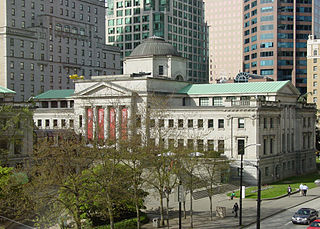
The Vancouver Art Gallery (VAG) is the fifth-largest art gallery in Canada, and the largest in Western Canada. It is located at 750 Hornby Street in Vancouver, British Columbia. Its permanent collection of about 11,000 artworks includes more than 200 major works by Emily Carr, the Group of Seven, Jeff Wall, Harry Callahan and Marc Chagall.

The Canadian Museum of Nature, formerly called the National Museum of Natural Sciences, is Canada's national natural history and natural sciences museum in Ottawa, Ontario. Its four main collections, which were started by the Geological Survey of Canada in 1856 and now include ca. 14.6 million specimens, are Botany, Mineralogy, Palaeontology and Zoology.
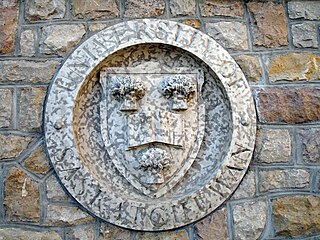
Tyndall Stone is a registered trademark name by Gillis Quarries Ltd. Tyndall Stone is a dolomitic limestone that is quarried from the Selkirk Member of the Ordovician Red River Formation in the vicinity of Garson and Tyndall, Manitoba, Canada. It is a cream-coloured limestone with a pervasive mottling of darker dolomite. The mottling gives the rock a tapestry-like effect, and it is popular for use as a building and ornamental stone.
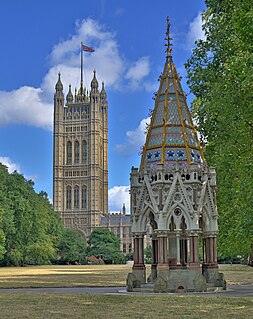
The Buxton Memorial Fountain is a memorial and drinking fountain in London, the United Kingdom, that commemorates the emancipation of slaves in the British Empire in 1834, and in particular, the role of British parliamentarians in the abolition campaign.
John (Jack) Davis, was a Canadian politician from British Columbia who was elected both federally and provincially.
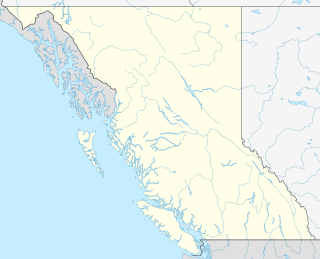
Haddington Island is a small volcanic island in the Canadian province of British Columbia, located south of Malcolm Island and Broughton Strait. It is located in the Mount Waddington Regional District.

Discovery Island Lighthouse is an active lighthouse built in 1886 on Pandora Hill which is the highest point on Discovery Island in the province of British Columbia, Canada.

The following outline is provided as an overview of and topical guide to British Columbia:

Centennial Square is a plaza in Victoria, British Columbia, Canada. It was built to celebrate the 100th anniversary of the incorporation of the City of Victoria. The Victoria Police Station, city hall and McPherson Playhouse are adjacent to the square. There is a fountain in the square.

The Cairn Formation is a geologic formation of Late Devonian (Frasnian) age in the Western Canada Sedimentary Basin. It was named for the Cairn River near its junction with the Southesk River in Jasper National Park by D.J. McLaren in 1955.
The Flume Formation is a geologic formation in the Western Canada Sedimentary Basin in Alberta, Canada. It was deposited as an extensive carbonate platform along the western edge of the basin during Late Devonian (Frasnian) time and the reefs of the Cairn Formation subsequently developed on it.
The Sulphur Mountain Formation is a geologic formation of Early to Middle Triassic age. It is present on the western edge of the Western Canada Sedimentary Basin in the foothills and Rocky Mountains of western Alberta and northeastern British Columbia. It includes marine fossils from the time shortly after the Permian-Triassic extinction event.
The Kootenay Group, originally called the Kootenay Formation, is a geologic unit of latest Jurassic to earliest Cretaceous age in the Western Canada Sedimentary Basin that is present in the southern and central Canadian Rockies and foothills. It includes economically important deposits of high-rank bituminous and semi-anthracite coal, as well as plant fossils and dinosaur trackways.

The British Columbia Legislature Cenotaph, also known as the Victoria Cenotaph and the War Memorial to the Unknown Soldier, is a war memorial, installed outside the British Columbia Parliament Buildings in Victoria, British Columbia, Canada. Unveiled by Lt.-Gov. W.C. Nichol on July 12, 1925, the granite cenotaph commemorates the sacrifices of Canadian Forces personnel and citizens during both World Wars, the Korean War and peacekeeping missions. The bronze statue was designed by sculptors Vernon and Sidney March.

Douglas Obelisk is an 8-metre (27 ft) marble obelisk, installed outside the British Columbia Parliament Buildings in Victoria, British Columbia. The sculpture was erected in 1881 to honour James Douglas, and was made by Mortimer & Reid using marble from Beaver Cove, Vancouver Island.

The Knowledge Totem Pole is a totem pole carved by Coast Salish artist Cicero August, installed outside the British Columbia Parliament Buildings, in Victoria, British Columbia. The pole was originally created for the 1994 Commonwealth Games.

Victoria Centennial Fountain, also known as Back Fountain or simply Centennial Fountain, is installed outside the British Columbia Parliament Buildings in Victoria, British Columbia. The fountain was designed by Robert Savery in 1962, and commemorates the four colonies and territories that formed British Columbia. The bronze sculptures of a bear, eagle, gull, sea otter, raven, and wolf represent the province's geography and history.
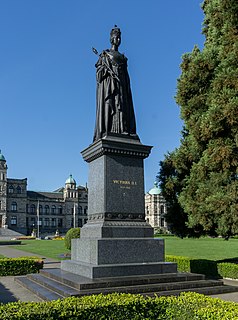
The statue of Queen Victoria is a bronze sculpture depicting Queen Victoria by British artist Albert Bruce-Joy, installed outside the British Columbia Parliament Buildings, in Victoria, British Columbia. The 4-metre (13 ft) statue was commissioned by Richard McBride in 1912, and competed in 1914. World War I delayed the sculpture's unveiling until 1921.

















